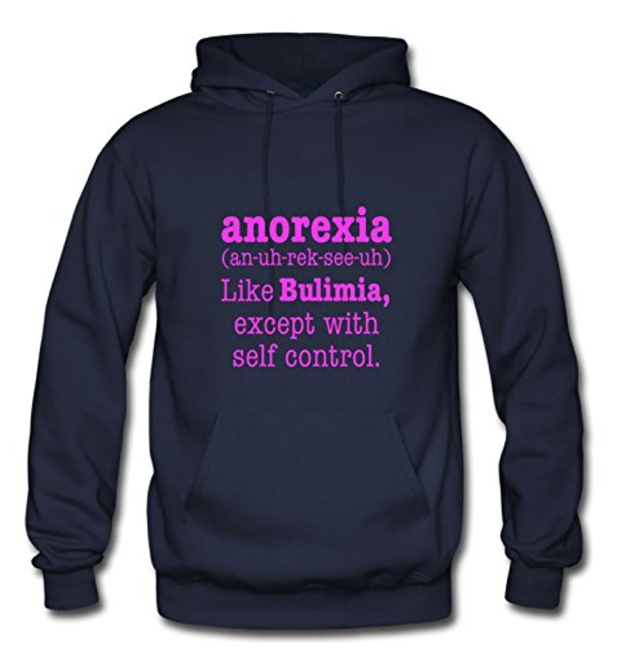The Deeper Issue With the Offensive Amazon 'Anorexia Hoodie'
Sometimes the news isn’t as straightforward as it’s made to seem. Juliette Virzi, The Mighty’s Associate Mental Health Editor, explains what to keep in mind if you see this topic or similar stories in your newsfeed. This is The Mighty Takeaway.
In the past few days, Amazon has been under fire for selling a controversial hoodie with the words, “Anorexia (an-uh-rek-see-uh) like bulimia, except with self control.”

Many took to Twitter to express their outrage and called for Amazon to remove the hoodie from their marketplace.
Im disgusted that someone actually thought "anorexia is bulimia with self control" was a suitable hoodie slogan, so thoughtless and cruel.
— AvocadhoeⓋ (@itsallzara) October 3, 2017
#VictoriaLIVE I find this hoodie very distasteful. I lost my sister on the 17th September, she was 44. Nothing funny about anorexia
— Ali Cogan (@sparkleybitz) October 3, 2017
This anorexic hoody is disgraceful! And it must be taken down! https://t.co/vfoxbWaMeM
— Hope Virgo (@HopeVirgo) October 3, 2017
It is a well-known fact that anorexia has the highest mortality rate of any mental disorder, and we cannot ignore the serious implications of products like these. Here’s what you need to keep in mind when you see news about the “anorexia hoodie” circulating:
1. Eating disorders aren’t a joke or “lifestyle choice.”
It’s one thing to make a tasteless and damaging joke about mental illness. It’s another thing entirely to print it on a hoodie and have a major retailer sell it on their website.
In a statement issued by the National Eating Disorders Association (NEDA) about the hoodie, CEO Clair Mysko said, “Jokes about eating disorders are dangerous and cliché. This hoodie propagates the myth that eating disorders are trivial and mere issues of willpower or self-control. Stereotypes like this result in increased stigma and are barriers that prevent people from seeking help. Anorexia is not a ‘lifestyle choice,’ it is a mental health disorder with socio-biological influences. We ask that Amazon stand with those affected by these deadly illnesses and remove the sweatshirt from their store.”
2. Eating disorders aren’t a competition.
Comparison is something people with eating disorders may be particularly vulnerable to. In an interview conducted by Victoria Derbyshire for BBC, Beth Grant, a woman who lived with anorexia for 13 years, commented on the fact the hoodie compared anorexia and bulimia.
“Especially for someone with bulimia… it could make them feel extremely not ‘ill enough.’ It could make them feel as if they are completely out of control and I think it could damage their mental health even further,” she told BBC.
Mighty contributor Sarah Ashley echoed this sentiment when she wrote, “The twisted concept of feeling like you are ‘not sick enough’ is one of the most dangerous parts of the disorder. Eating disorders are not a contest.”
She’s right. Eating disorders are not a contest, but this hoodie makes it a contest by positioning one eating disorder as “better” than the other.
3. Eating disorders aren’t about “self-control.”
Idolizing or taking pride in eating disordered behaviors is not only problematic, it’s dangerous. According to NEDA, “Our culture’s toxic messages around [food, weight and dieting] mean that eating disordered behaviors can be praised, and a clinical disorder disguised as just another diet.”
What may appear as “self-control” on the outside may not actually be control at all. In her piece, “When Your Eating Disorder Is About the Desire for Control,” Mighty contributor Louise Maher describes that in her quest for control, her eating disorder ends up controlling her. “It’s when I start to lose control that my eating disorder presents itself to me as somewhat of a comfort blanket; except this comfort blanket will soon wrap its way around me, suffocating me,” she wrote.
When we glorify one mental illness for its emphasis on “self-control” and imply another “lacks self-control,” we’re saying it’s only acceptable (or in this case, desirable) to have a mental illness as long as you are seemingly still functioning “well.”
What’s more, this hoodie highlights the very real fat phobia society perpetuates. Because we tend to align anorexia with “thinness” (desirable and in control) and binge behaviors with “fatness” (lazy and out of control) people who engage in binge eating often never receive the help they need.
In a study examining the implications of internalized weight bias on binge eating and emotional well-being, researchers found that individuals who believed harmful weight stereotypes were true reported more frequent binge eating. In another study examining obesity stigma, researchers reported the same finding, but also found experiences of weight stigma contributed to poor psychological functioning as well.
Perpetuating the notion that anorexia is “better” than bulimia because it is an exercise of self-control is a prime example of fat shaming. It contributes to the false idea that eating disorders, like other mental illnesses, are self-inflicted and always in our “control” to change.
We can’t continue to value some mental illnesses over others, because they seem more “controlled” or more “high-functioning” on the outside. There is nothing shameful about having bulimia, or struggling with binge eating — just as there is nothing shameful about struggling with anorexia.
For the people who have ever felt “out of control,” we see you and hear you. You are not alone.
If you or someone you know is struggling with an eating disorder, you can call the National Eating Disorders Association Helpline at 1-800-931-2237.

